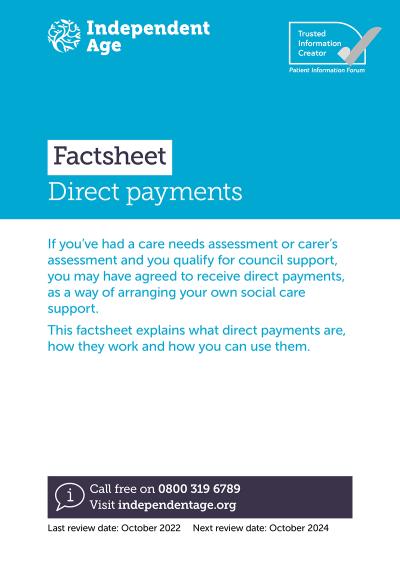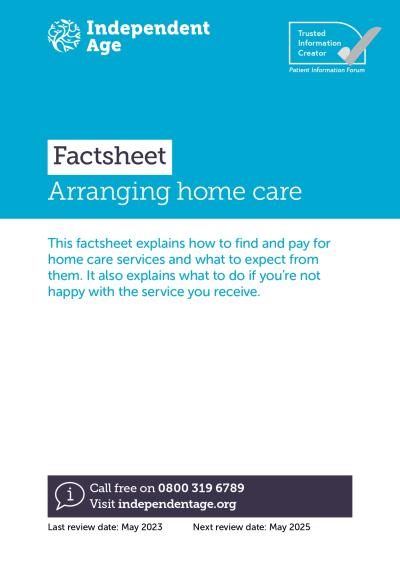Related publications

Direct payments

Arranging home care

Paying for care at home in England and Wales

If your council are paying towards your care, you can choose to take their contribution as a direct payment and arrange services yourself.
Start by getting a care needs assessment, which looks at your needs to decide if you qualify for support. If you do qualify, you'll usually have a separate financial assessment to see whether the council will pay towards your care.
If you qualify for support and the council will be paying towards your care, then you can usually ask for direct payments – you receive the money from the council and buy your own support services.
You can’t usually receive direct payments if you will be permanently moving into a care home. Instead, the council’s contribution towards your care will be paid directly to the care home.
You can use your direct payments to organise your care in a way and at times that make sense to you as long as it meets your eligible needs. For example, you could:
The council will ask for proof of how you are spending your direct payments.
Not everyone will want to arrange their own care services – you may not feel comfortable being an employer, for example. Or you may be happy for the council to arrange care services for you, particularly if you don’t have strong preferences about who provides your support.
If you’re interested in direct payments but think it might be too much to manage, remember that help is available with tasks that you might find difficult, such as dealing with paperwork and keeping records of what your direct payments have been spent on. You can also nominate someone to manage your direct payments for you. This could be a friend or family member.
If you lack mental capacity to make decisions about your care, you are still entitled to direct payments. A suitable person must manage the direct payments on your behalf. That could be:
The council should also involve you as far as possible: for example, by communicating in ways that you understand, or by considering what you had previously said your wishes were.
If you decide to use your direct payments to employ someone as a care worker (also called a personal assistant) you will have some legal responsibilities as an employer. These include:
Your council should provide you with details of local organisations that can give you advice about becoming an employer and help you to find a suitable carer. You can also find information on employing staff for the first time on Gov.uk.
If you are a carer, you should start by having a carer’s assessment. If you qualify for help in your caring role and the council pays for some or all of your support, you can usually choose to receive this in the form of direct payments. You can’t use your direct payments to buy services for the person you’re caring for. For more information, see our guide Caring for someone.
In England and Scotland, if your local council is going to help arrange your care, you have the right to know how much money they have calculated will be needed to meet your care needs. In England, this is called your 'personal budget'. Your personal budget must be high enough to meet your eligible care needs and any other needs that your council decides should be met.
The council will not necessarily provide the total amount of money needed for your personal budget. Depending on your financial situation, you may have to contribute some of your own money towards this.
You may be able to receive the council's contribution towards it in a number of ways, including:
You can also choose to have a combination of these in England and Scotland. The council must agree with your choice and should provide you with information and advice to help you make a decision.
You could use a support planning service (also called a brokerage service). Some voluntary organisations offer them. If the support planning service isn’t free, the cost should be included as part of your personal budget. Ask your council for details of services in your area.
If you’re moving into a care home permanently, you must also be given a personal budget and a care plan, but you can’t receive direct payments.

Contact your local council to arrange a care needs assessment.
For advice on using direct payments, contact the Personal Budgets Helpline at Disability Rights UK.